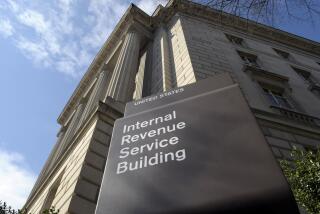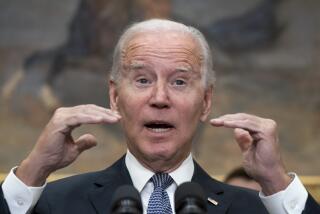U.S. Deficit Jumps 15% to Record $211.9 Billion
- Share via
WASHINGTON — The federal government ran up a record deficit of $211.9 billion in fiscal 1985, up almost 15% from the previous year, the Treasury Department announced today.
The figures, contained in a final accounting of revenues and spending, made official what had been long predicted--that the debt for the fiscal year ended Sept. 30 would set a record.
The $211.9 billion topped the old deficit of $207.8 billion set for fiscal 1983. In fiscal 1984, the deficit fell somewhat to $185.3 billion.
The new deficit total was $600 million below an Administration projection in August and was almost 5% lower than a February estimate of a $222.2-billion deficit.
Lower Interest Rates
Officials said that declines in interest rates this year, which lowered the government’s costs of carrying the $1.8-trillion national debt, and reduced defense spending had helped to hold the overall figure below the February estimate.
The Administration is predicting that the deficit for the 1986 fiscal year, which began Oct. 1, will decline to $177.8 billion.
The 1985 deficit included spending in both the so-called on-budget and off-budget accounts. The Administration and many in Congress contend that both figures should be used to accurately reflect total government spending. If only on-budget categories are considered, the 1985 deficit would still be a record, but a smaller $202.8 billion, compared to the previous record for on-budget items of $195.4 billion, set in 1983.
Spending Rate Rises
Considering both categories, revenues in 1985 totaled $734 billion, up 10.1% from 1984. Spending rose at an even faster 11% rate, climbing to $945.9 billion.
The final deficit figures for 1985 came as the Administration struggled to meet new deficit targets for the budget it will submit to Congress for the 1987 fiscal year.
Most federal agencies have been told by the Office of Management and Budget that they must reduce their requests for fiscal 1987 because their initial spending plans were over President Reagan’s targets, according to management and budget spokesman Edwin L. Dale Jr.
Efforts to prepare a new budget for submission to Congress next February are being complicated this year by the President’s endorsement of deficit-chopping legislation by Sens. Phil Gramm (R-Tex.) and Warren B. Rudman (R-N.H.).
Annual Increments
That measure, which already has passed the Senate and is widely expected to win overall congressional approval in some form, calls for reducing the deficit in annual $36-billion increments until it disappears in five years.
It would require the President to propose much deeper budget cuts than he proposed last February--cuts that proposed the abolition of about 20 federal agencies and programs, including the Small Business Administration and Amtrak subsidies. Congress largely ignored the proposals, axing just one program, revenue sharing.
The President has ruled out tax increases as a way of reducing deficits.
Even before Reagan had voiced his support for the Senate plan, most Cabinet agencies already had submitted budget requests exceeding earlier ceilings set by the President, Administration officials said.
More to Read
Get the L.A. Times Politics newsletter
Deeply reported insights into legislation, politics and policy from Sacramento, Washington and beyond. In your inbox twice per week.
You may occasionally receive promotional content from the Los Angeles Times.










